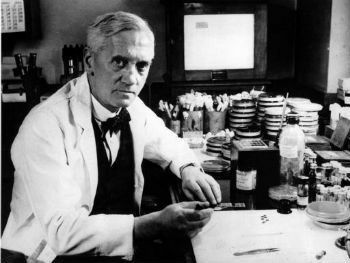Alexander Fleming was a Scottish scientist, physician and bacteriologist.
He is recognized for the discovery of penicillin, considered one of the most important for mankind. Through it, thousands of people were cured of infections that could lead to death.
Currently, penicillin is the most used antibiotic in the world.
Despite acknowledging his discovery, Fleming declared the following sentence:
"I didn't invent penicillin. Nature made it. I just discovered it by chance"
Biography
Alexander Fleming was born on August 6, 1881, in Lochfield, Scotland. He was the son of a farmer and had seven brothers.
 Alexander Fleming
Alexander Fleming
Fleming was an excellent student throughout the basic study. At age 13, he moved to London, where he attended polytechnic school and worked for years as an office boy in an office.
Fleming decided to pursue a medical career and entered the St. Mary School of Medicine. Early in his studies, he began to research antibacterial substances that were not toxic to humans.
During World War I, Fleming served in the British army, acting as a naval doctor. On that occasion, he saw several soldiers die from injuries and infections.
After the war, he returned to St. Mary's Hospital, where he worked as a teacher. At the same time, he was developing research in search of new antiseptics for the treatment of infections, without destroying healthy tissue or reducing the body's defenses.
The Discovery of Penicillin
In 1921, Fleming accidentally splashed onto a plate with colonies of bacteria he observed that there was a substance capable of destroying them. He named this substance the lysozyme and published scientific articles to publicize his discovery.
In 1928, Fleming was looking at some plates with bacterial cultures when one caught his attention. This plaque had been contaminated by fungal spores present in the air. Fleming thought this was a common contamination, until he noticed that around the fungus, the bacteria had disappeared, while in other parts of the plaque they were still present.
For months, Fleming carried out several experiments concluding that the fungusPenicillium notatum, had a substance capable of killing bacteria. This substance was given the name of penicillin.
The results of his study were published in the British Journal of Experimental Pathology.
Despite the relevance of his discovery, Fleming did not have the financial resources to produce a drug. He chose not to patent his discovery, so that it could be used by other scientists.
Only in 1940, scientists Howard Florey and Ernst Boris Chain dedicated themselves to creating an antibiotic based on penicillin. In 1941, they documented nearly 200 cases of treating infections with the new drug.
The discovery of penicillin and the development of the antibiotic earned Alexander Fleming, Howard Florey and Ernst Boris Chain the Nobel Prize for Medicine in 1945.
Tributes and Awards
Alexander Fleming received several honors and awards:
- Honorary Gold Medal from the Royal College of Surgeons (1946);
- Cameron Prize from the University of Edinburgh (1945);
- Moxon Medal, from the Royal College of Physicians (1945);
- Nobel Prize in Medicine (1945);
- Royal Society of Arts Gold Medal (1946);
- Gold Medal of the Royal Society of Medicine (1947);
- United States Medal of Merit (1947);
- Received nearly 30 doctoral degrees Horonis cause from European and American universities.
Death
Alexander Fleming died in 1955 after a heart attack. He was buried in Saint Paul's Cathedral in London.
Read too:
Diseases caused by bacteria



